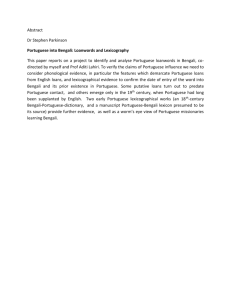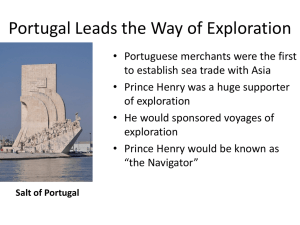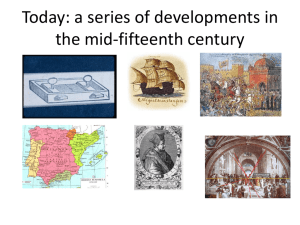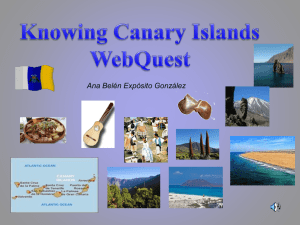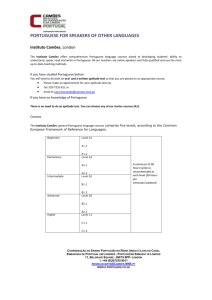present - Europe: so far, so near
advertisement
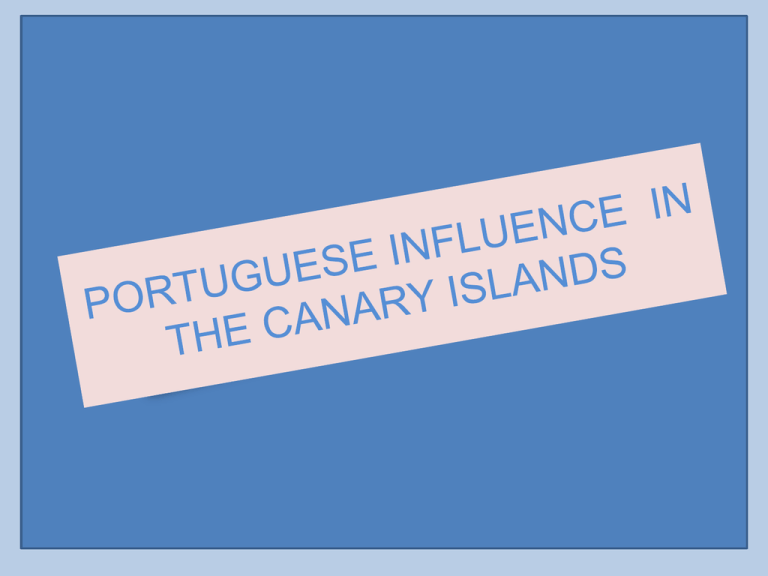
The Portuguese in the Canary Islands During the XV, XVI and XVII centuries, the portuguese emigrated to the Canary islands. And there was founded a wide colony of farmers, craftsmen and sugar specialists. The fingerprint left in the islands by these first settlers lasts to the present day. Surnames of Portuguese origin Abreu, Acosta, Afonso, Bacallado, Barreto, Coello, Correa, Curbelo, Delgado, Déniz, Dorta, Falcón, Fariña, Fumero, Galván, Henriquez, Jorge, Leal, Lemus, Luis, Marrero, Matos, Mederos, Méndez, Mesa, Mora, Pacheco, Padrón, Pestano, Pinto, Portugués, Ramos, Rivero, Sosa, Tavío, Tejera, Viera, Yanes. SURNAMES OF PORTUGUESE ORIGIN HISPANICIZED Alvares, Cabreira, Dias, Domingues, Fernandes, Gomes, Gonçalves, Hernandes, Lopes, Martins, Peres, Rodrigues, Soares… That were hispanicized changing them her finals into the Castilian zed. INFLUENCES IN THE CANARY DIALECT The Canary dialect is widely influenced by the Portuguese language. Many of its words and expressions derive from this language. MILHO MILLO GAVETA GAVETA FUNIL FONIL FECHO FECHILLO CORUJA CORUJA HORTELã HORTELANA MOLHO MOJO FOLKLORE A typical Canary Dance, Portuguese origin… FOLIA of remote INTRUMENTS The timple and the portuguese cavaquiño belongs to the family of rope instruments with a common origin. INSTRUMENTS TYPICAL PORTUGUESE DRESSES THIS IS THE TYPICAL DRESS FROM MADEIRA Similar to the typical dress from Tenerife. CRAFTS OF WICKER It is a prestigious industry in Madeira, whereas in Canaries it is a small familiar industry. GASTRONOMIC SIMILARITIES These are some of the plates we have in common: The ovos-moles (soft eggs),they are one of the most known product from Aveiro's city . The huevos moles, of Portuguese origin, have settled in the traditional Canary kitchen. Portuguese “puchero” Canary “puchero” Viseu’s Rancho Canary Rancho INFLUENCES IN THE CANARY ARCHITECTURE Nuestra Señora de la Asunción church ( XVI century - San Sebastián de la Gomera) WOOD CRAFT INFLUENCE The Portuguese who emigrated to the islands were especially craftsmen who worked the wood very well, so they left a great legacy in ceilings, windows and balconies in the islands. San Salvador church (La Palma). Its ceiling is made of wood. Betancuria’s church (Fuerteventura), whose ceiling is made of wood, from portuguese influence. Canarian balconies and windows

